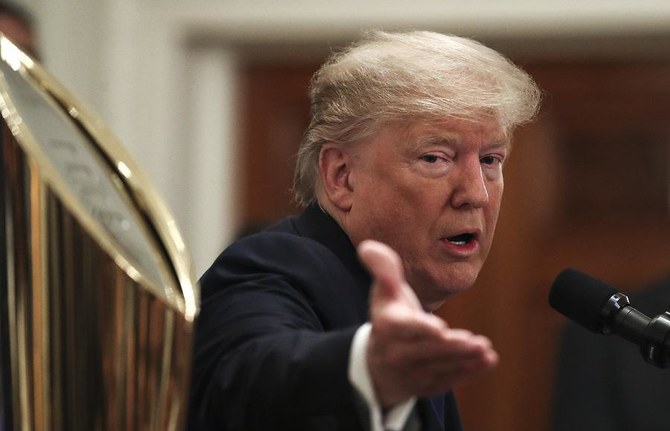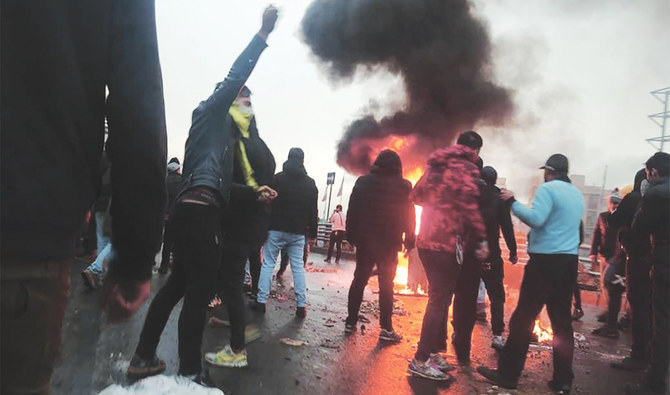WASHINGTON, TEHRAN: President Donald Trump on Friday warned Iran’s supreme leader, Ayatollah Ali Khamenei, to be “very careful with his words.”
“The so-called ‘Supreme Leader’ of Iran, who has not been so Supreme lately, had some nasty things to say about the United States and Europe,” Trump tweeted of Khamenei’s comments earlier Friday in Tehran.
According to Trump, Khamenei’s blistering speech, in which he attacked the “vicious” US and described Britain, France and Germany as “America’s lackey’s,” was a mistake.
“Their economy is crashing, and their people are suffering. He should be very careful with his words!” Trump tweeted.
Khameini lashed out at Western countries as he led Friday prayers in Tehran for the first time in eight years, dismissing “American clowns” who he said pretend to support the Iranian nation but want to stick their “poisoned dagger” into its back.
The so-called “Supreme Leader” of Iran, who has not been so Supreme lately, had some nasty things to say about the United States and Europe. Their economy is crashing, and their people are suffering. He should be very careful with his words!
— Donald J. Trump (@realDonaldTrump) January 17, 2020
Khamenei used his rare appearance at the weekly prayers to deliver a fiery address in which he insisted Iran would not bow to US pressure after months of crushing sanctions and a series of recent crises — from the American killing of a top Iranian general to Iran’s accidental shoot-down of a Ukrainian passenger plane.
“These contemptible governments are waiting to bring the Iranian nation to its knees,” Khamenei said.
“America, who is your elder, your leader and your master, was not able to bring the Iranian nation to its knees. You are too small to bring the Iranian nation to its knees.”
Iranians unhappy
Some Iranians reacted angrily to the speech by Khameini, which they said sought to downplay days of protests after a tension-filled month in the Islamic republic.
“He didn’t even try to calm the people and totally ignored the protesters,” said one activist in Iran. Like other Iranians contacted by AFP from outside the country, she asked to remain anonymous for fear of repercussions.
Protests erupted after the Iranian government admitted to having accidentally shot down a Ukrainian jet on Jan. 8, killing all 176 people on board.
In the sermon, Khamenei called the downing a “bitter” tragedy.
But he said it should not overshadow the “sacrifice” of top Iranian commander Qassem Soleimani, who was killed in a US drone strike in Iraq on Jan. 3.
“He openly declared that Qassem Soleimani was more important than the passengers of the Ukrainian plane,” the activist said.
To avenge Soleimani’s death, last week Iran launched a barrage of missiles on an Iraqi base housing US troops. Hours later, it downed the Boeing 737.
Another Iranian responded to the speech via the Telegram messenger app, saying Khamenei “said bluntly... the dead, whether on the ground or in the sky, are not important to me.”
Friday’s speech came after a traumatic month in which Iran appeared to be tipping toward war with arch foe the US in the wake of Soleimani’s killing.
SPEEDREAD
Iranians reacted angrily to the speech by Khameini, which they said sought to downplay days of protests after a tension-filled month in the Islamic republic.
Khamenei last led Friday prayers at Tehran’s Mosalla Mosque on the 33rd anniversary of the Islamic revolution in February 2012, at another time of crisis over the Iran nuclear issue.
On Friday, Khamenei insisted that demonstrations over the downing of the jet were not representative of the Iranian people.
“When he says these people are not one of us, it deepens divisions among people and widens the distance between the people and the government,” a 24-year-old artist in Tehran told AFP.
“And it makes someone like myself, who is not close to the regime, seek change even more aggressively,” he added.
One Iranian Twitter user posted that “ignoring the protesters and reducing them to a few hundred compared to Qasem Soleimani’s funeral is the perspective of the regime.”
Hundreds of thousands of people had filled the streets of several cities in Iran to mourn Soleimani in the days after his death.
“There was nothing new, just slogans, slogans and slogans. He didn’t even observe a minute of silence for the victims of the plane crash,” a 35-year-old woman told AFP.

























